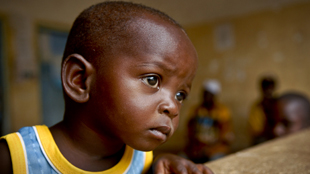 A boy waits with his mother for his malaria lab results at a dispensary in Tanga, Tanzania. WIKIMEDIA COMMONS, U.S NAVY MASS COMMUNICATION SPECIALIST 2ND CLASS JOHANSEN LAUREL
A boy waits with his mother for his malaria lab results at a dispensary in Tanga, Tanzania. WIKIMEDIA COMMONS, U.S NAVY MASS COMMUNICATION SPECIALIST 2ND CLASS JOHANSEN LAUREL
Iron deficiency may protect against malaria infection and mortality, reports a new study published Sunday (April 15) in Clinical Infectious Diseases. The data, gathered from nearly 800 Tanzanian children followed from birth to age three, support growing doubt regarding iron supplementation in children and pregnant women living in malaria-endemic areas.
“This study provides new data indicating that naturally occurring iron deficiency is actually protective against malaria,” Philip Fischer, a Mayo Clinic pediatrician who was not involved in the research, wrote in an email. The project expands upon previous studies that had suggested that iron supplementation increased risk of malaria infection, Fischer explained.
Understanding the interaction between malaria infection and iron is of paramount importance in areas where malaria kills many children, said Patrick Duffy, study ...



















